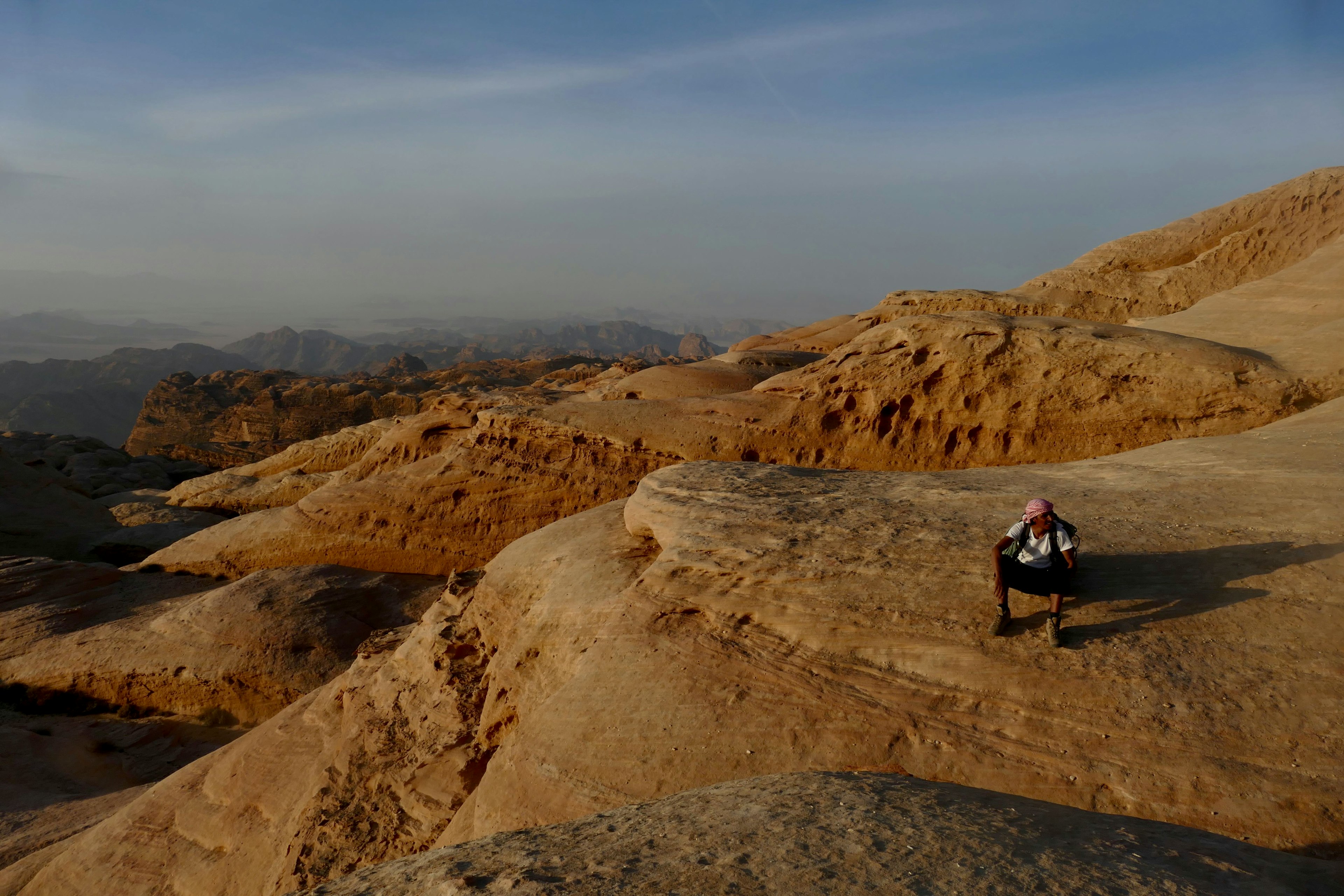
A new long-distance hiking trail in Jordan will take you through the wonders of Wadi Rum

Mar 16, 2023 • 4 min read

Along the Wadi Rum Trail, your Bedouin guide will help you discover routes – including rock-climbing sections – that have been in use for millennia © courtesy Wadi Rum Trail
Travelers to Jordan now have a brand-new way to experience the iconic desert of Wadi Rum: on the 75-mile Wadi Rum Trail.
The new route has been developed in conjunction with local Bedouin tribes who call this protected area home. Known for its dramatic desert landscapes, rust-red sands and enigmatic canyons carved with petroglyphs, Wadi Rum is one of the most popular destinations in Jordan for visitors – and has gained even more fame since serving as an otherworldly backdrop for Dune, Star Wars and The Martian.
Paths through Wadi Rum
Hiking is far from a new way to take in Wadi Rum. Countless generations of travelers, traders, hunters, shepherds and hajj pilgrims en route to the holy cities in Saudi Arabia have walked paths through these sands, including the pre-Islamic Nabataeans who built the remarkable sandstone cities in Petra and Hegra. Yet the Wadi Rum Trail invites visitors to experience a different side of the desert, and to enjoy its beauty on a slower and more intentional visit.
“Wadi Rum is one of the most beautiful deserts on Earth, but most visitors see only a small part of it today,” said Ben Hoffler, co-founder and developer of the trail. “Four-by-four tourism dominates the region heavily, and its deserts are typically seen from the back of a pickup truck, usually on accelerated tours around established tourist attractions.”

Walking and climbing with the Bedouin
The Wadi Rum Trail has been three years in the making. About 10 tribesmen scouted its route, including Bedouin living in Saudi Arabia, who once moved freely around this region, their traditional territory, but are now separated by modern borders.
In addition to hiking, the new trail also incorporates scrambling and rock-climbing routes that have been used for millennia – a unique feature.
“Wadi Rum’s mountains are home to some of the oldest known rock climbs in the Middle East,” Hoffler said. “The early people of Wadi Rum’s deserts climbed to reach the high, quiet parts of the mountains where ibex could be best stalked. The tradition of climbing was continued by Bedouin tribes who arrived in later ages, with most climbers going barefoot, unroped and often alone, scaling the highest, most difficult mountains of the region. Wadi Rum’s Bedouin are the guardians of a climbing tradition of great antiquity that remains alive in the region today.”

How to hike the Wadi Rum Trail
The Wadi Rum Trail is designed to be walked with a Bedouin guide from the local community, not explored independently. Going on the route with the Bedouin allows them to share their traditional knowledge, skills and heritage.
“The Wadi Rum Trail is a natural path that serves visitors away from tourist routes,” said Sabbah Eid of the Anaza tribe, who oversaw scouting work on the trail. “It is a beautiful route and encourages and supports the local people in Wadi Rum. It connects the past and present and keeps the heritage, climbing and the paths of ancient Bedouin, educating the modern generation to ecotourism.”
The whole circuit takes 10 days, but travelers short on time can complete sections of it instead. It’s also possible to skip the rock climbing – though the current segments rank as the easiest grade. Hikers can decide on the day what they feel up for tackling.
The Wadi Rum Trail’s management does not organize hikes, but instead serves as a clearinghouse for guides, connecting travelers to Bedouin tour operators.
“Walking the remote, waterless deserts these trails traverse would be difficult without Bedouin support,” Hoffler said. “It is Bedouin support that has opened up some of the most beautiful, little-known parts of the region for long-distance hiking in the last decade, all of which would have remained inaccessible and off the hiking map otherwise.”
The Wadi Rum Trail is a sister project to Egypt’s Sinai Trail and Red Sea Mountain Trail, two long-distance paths that also allow outsiders to get a closer experience and connection with Bedouin traditions.
“We hope it gives Wadi Rum the long-distance hiking trail it has long deserved, one that centers squarely on this region alone and that we believe step for step, kilometer for kilometer, shows the absolute best of not just its well-known, heavily visited tourism heartlands, but the more remote, little-trodden wilderness in its hinterlands, too,” Hoffler said.
Explore related stories

Hiking
How to hike the Jordan Trail, a cross-country trek in the Middle EastJun 11, 2024 • 5 min read








